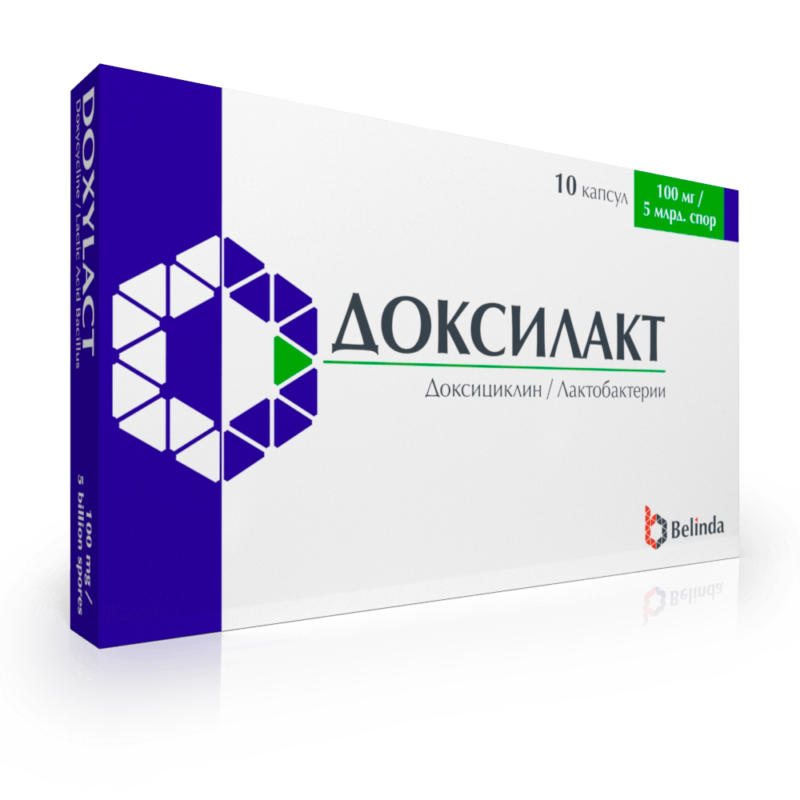
Doksilakt
PRESCRIPTION
Doxycycline hydrochloride is a semi-synthetic tetracycline, a broad-spectrum bacteriostatic antibiotic.
Manual
Each hard gelatin capsule contains:
- Doxycycline hydrochloride BP eq. doxycycline 100 mg (in the form of granules)
- Lactic acid bacteria 5 billion spores (enteric coated granules)
Infectious and inflammatory diseases caused by sensitive microorganisms:
- respiratory tract infections (pharyngitis, acute and chronic bronchitis, tracheitis, bronchopneumonia, lobar pneumonia, lung abscess, pleural empyema);
- infections of the upper respiratory tract (otitis media, tonsillitis, sinusitis, etc.);
- infections of the genitourinary system (cystitis, pyelonephritis, prostatitis, urethritis, urethrocystitis, urogenital mycoplasmosis, endometritis, endocervicitis, acute orchiepididymitis, gonorrhea, chlamydia of various localizations, syphilis);
- infections of the biliary tract and gastrointestinal tract (cholecystitis, cholangitis, gastroenterocolitis, bacterial dysentery, traveler’s diarrhea);
- infections of the skin and soft tissues (cellulitis, abscesses, furunculosis, panaritium, infected burns, wounds, etc.);
- infectious eye diseases caused by Chlamydia spp. as part of complex therapy, yaws, yersiniosis, legionellosis, rickettsiosis, Q fever, Rocky Mountain spotted fever, typhus (including typhus, tick-borne relapsing), Lyme disease stage I, bacillary and amoebic dysentery, tularemia, cholera, actinomycosis , malaria;
- as part of combination therapy – leptospirosis, trachoma, psittacosis, ornithosis, granulocytic ehrlichiosis;
- whooping cough, brucellosis, osteomyelitis.
Inside.
For adults and children over 8 years old weighing more than 45 kg, the average daily dose is 0.2 g on the first day (divided into 2 doses – 0.1 g 2 times a day), then 0.1 g per day (after 1-2 doses). For chronic infections (especially of the urinary system) – 200 mg per day throughout the entire period of therapy. When treating gonorrhea, one of the following regimens is prescribed: acute uncomplicated urethritis – a course dose of 0.5 g (1 dose – 0.3 g, the next 2 – 0.1 g each with an interval of 6 hours) or 0.1 g per day before complete cure (in women) or 0.1 g 2 times a day for 7 days (in men); for complicated forms of gonorrhea, the course dose is 0.8-0.9 g, which is divided into 6-7 doses (0.3 g -1 dose, then with an interval of 6 hours for 5-6 subsequent doses). When treating syphilis – 0.3 g per day for at least 10 days.
For uncomplicated infections of the urethra, cervix and rectum caused by Chlamydia trachomatis, 0.1 g is prescribed 2 times a day for at least 7 days. Infections of the male genital organs – 0.1 g 2 times a day for up to 4 weeks. Treatment of malaria resistant to chloroquine – 0.2 g per day for 7 days (in combination with schizonticidal drugs – quinine); prevention of malaria – 0.1 g 1 time per day 1-2 days before the trip, then daily during the trip and for 4 weeks after return; children over 8 years old – 2 mg/kg 1 time per day. “Travelers’ diarrhea” (prevention) – 0.2 g on the first day of the trip (at one dose or 0.1 g 2 times a day), then 0.1 g 1 time a day during the entire period of stay in the region ( no more than 3 weeks).